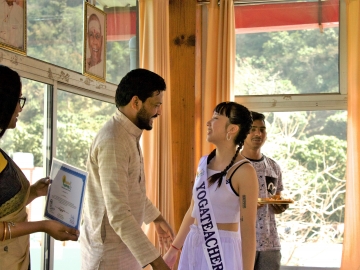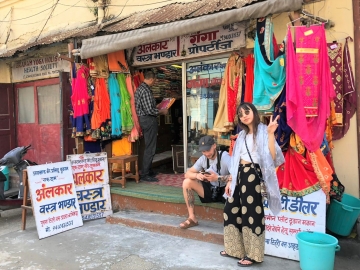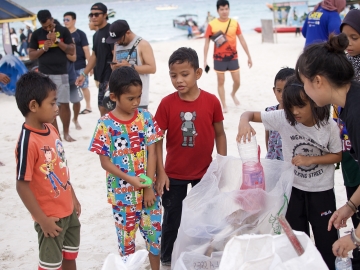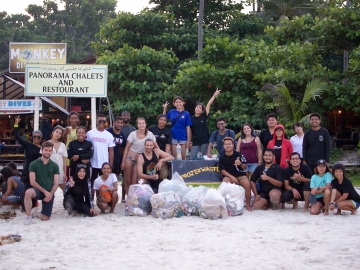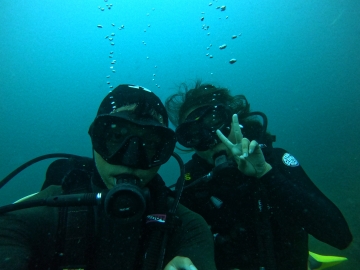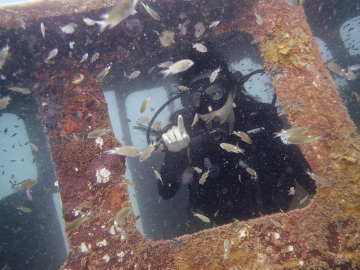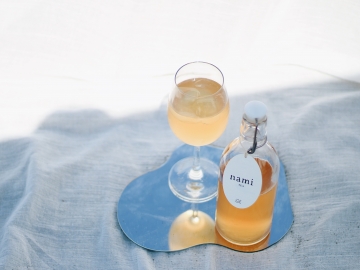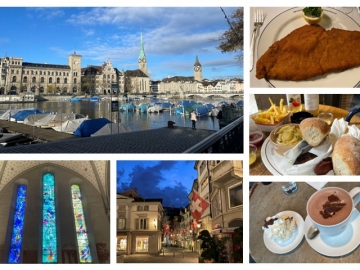“After discovering yoga, I learned how to appreciate myself and others more”
School of International Liberal Studies (SILS) 4th year student
Szelynn Lim (Zen)
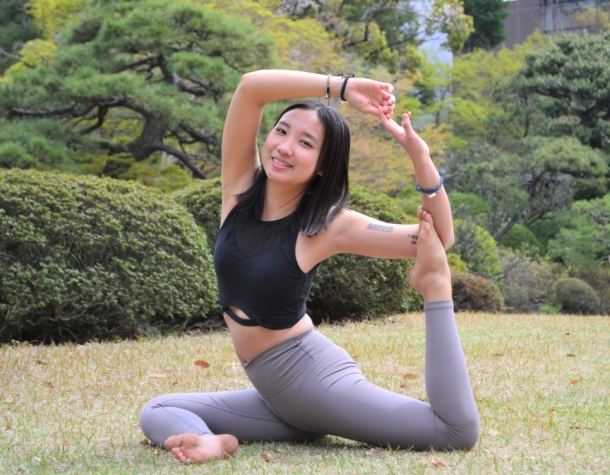
Zen striking a mermaid pose at Okuma Garden on Waseda Campus
After discovering yoga, Zen, a 4th year Malaysian student from the School of International Liberal Studies (SILS), experienced huge growth spiritually, physically, and emotionally. To gain more knowledge about yoga, she went to India for a month in January 2020 where she earned her yoga instructor certification. Now, Zen continually strives for self-improvement while teaching yoga both at a yoga studio and online. In addition to that, she is passionate about tackling environmental issues. She started an environmental and beach conservation organization called ProjekWaste when she realized there was a large amount of waste and coral bleaching on the islands in her home country Malaysia. In this article, I interviewed Zen about the changes she has experienced through yoga, her thoughts about dealing with environmental issues, as well as her outlook for the future.
――Could you tell me about how you became a yoga instructor?
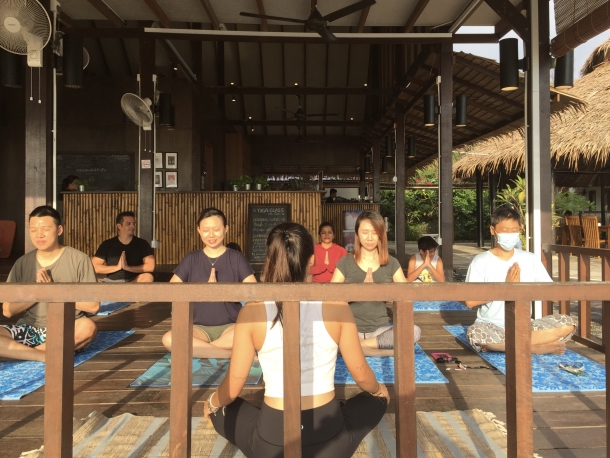
Zen teaching yoga in Malaysia
About 3 or 4 years ago, I experienced some back pain so I started going to a couple of yoga classes. It was there that I met instructors who taught me not just yoga poses, but also the spiritual aspects which helped heal both my mind and body. This intrigued my interest in learning more about yoga. In January 2020, I decided to immerse myself in the birthplace of yoga. So, I went to Rishikesh in India for a month to deepen my yoga practice. Over there, I obtained my yoga teacher certification with the International Yoga Alliance (RYT 200), and now I teach yoga every week in the studio and online.
――What changes did you experience after starting yoga?
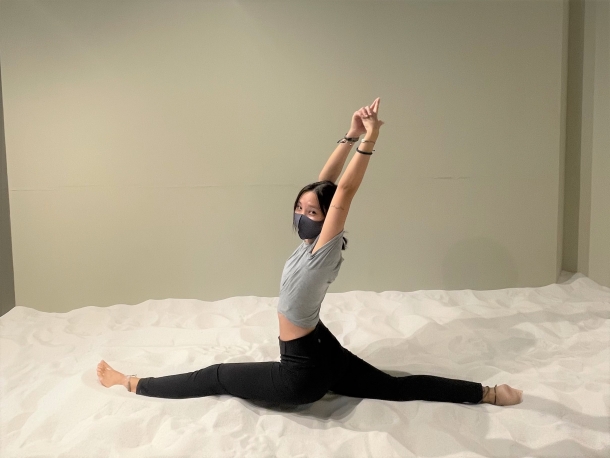
Self-practice in addition to teaching yoga
I am now able to focus on the present moment and practice “mindfulness”. Before yoga, I didn’t know how to cope whenever I was feeling down, and I didn’t pay attention to myself, for example, my eating habits and lifestyle. I would worry about how people viewed about me, and while studying in Japan as an international student, I would try to fit in with the Japanese people instead of being myself. After I started incorporating yoga into my lifestyle, I acknowledged the importance of consciousness, and am slowly able to organize and understand my feelings, words, and actions. Now I am proud to say that I am able to take better care of myself and others. I have also learned not to be affected by my surroundings, but to treasure my roots, be my true self and let my individuality shine. I feel like I have become a completely different person.
――What did you learn when you were in India? Also, how did you feel when you started teaching yoga?
In India, I spent the whole month with 10 other yoga practitioners from various parts of the world with the same passion for yoga. The lessons would start every day at 6am in the morning and would go on until 7pm in the evening. We had lessons on yoga, philosophy, anatomy, meditation, etc., and we clocked 200 hours of lesson time in a month. At the end, I passed a written exam and a practical exam to get the qualification to hold my own yoga classes.
Left: Graduating yoga school in January 2020
Right: Sightseeing during days off from yoga lessons. Zen still keeps in contact with the other students she met in India.
During my yoga teacher training, meeting with experienced yoga masters and teachers, as well as other students who had a very advanced level of yoga skills, made me feel like I had a lot more to learn. When I started instructing my own lessons, I came to realize the challenge in teaching. Although initially I was not planning to teach, I realized that I learned a lot through teaching others, and that’s why I continued sharing what I was taught. Right after India, I was caught in lockdown, so I taught yoga to my parents at home. It was a memorable starting point for my teaching journey. Currently, I sometimes join yoga classes held by other instructors to learn more and get inspired, while also practicing regularly on my own. Even though I am still new at this, I am honored and glad that there are students who are interested in what I teach, and who keep coming back to learn more from me.
――From starting up an environmental and ocean sustainability organization called “ProjekWaste” to other activities, you seem to be quite involved in tackling environmental issues.
After returning from India, I was back in my hometown for almost one and a half years due to the pandemic. For about six months during that time, I lived in a remote island near my hometown, Perhentian Island, and taught yoga at a resort there. As I walked on the beaches and took up scuba-diving, I witnessed the amount of trash on the beach, underwater bleached corals, and other issues around that I felt the need to do something about it. That led me to start my environmental/ocean sustainability organization ProjekWaste with my co-founder and partner, who was a diving instructor then at the island. Together with about 10 members, we mainly do beach clean-ups, campaigns, and have partnered with establishments on the island to promote environmental sustainability and conservation activities, as well as promoting awareness on social media.
A ProjekWaste beach clean-up in Malaysia. These activities are also being done in Enoshima, Japan.
I am currently interning with PADI Japan, the world’s largest scuba diver training organization, focusing on marine conservation. For me, the beauty of diving is that it’s not just for recreation, but it is also a purpose driven tool to contribute to environmental conservation efforts such as retrieving marine debris, doing underwater research, or activities such as coral planting. I hope more people get to try diving and witness the actual situation underwater which is highly affected by the climate crisis.
Zen diving. Left: An underwater shot with her co-founder of ProjekWaste.
When I was back in Malaysia during the pandemic, I started a sustainable brand by the name of “nami”, which means “wave” in Japanese, inspired by the freedom and healing effect of the ocean. Currently I’m operating in Japan and some of the products include namitea—organic kombucha, and namiwear—
upcycled apparels made from recycled clothes dyed with natural dyes.
Left: Kombucha product named “namitea”. A fermented black tea drink which is different from the Japanese kombu tea. Made from fruits which would be thrown away because of their bad physical appearance and homemade herbs.
Right: Upcycle product called “namiwear” made from recycled clothes dyed with natural dye.
Additionally, I was enrolled in the first batch of students at Green Innovator Academy, a project which aims to cultivate innovators who can create a positive cycle between the economy and environment. Other than that, I am also teaching yoga and sharing about environmental issues as a member of Wellness Laboratory, a community that strives for sustainable living and wellbeing through yoga.
In tackling environmental issues, it is easy to feel powerless when you are by yourself. When that happens, I have found that being with people across the world with the same goals makes us stronger as a collective community. Even though each individual action may be small, I believe they all add up to have a huge impact. Environmental and social issues ultimately boil down to each and everyone’s actions. I hope that everyone will take some time to think deeply about this.
――Why did you choose to study in Japan and at Waseda University?
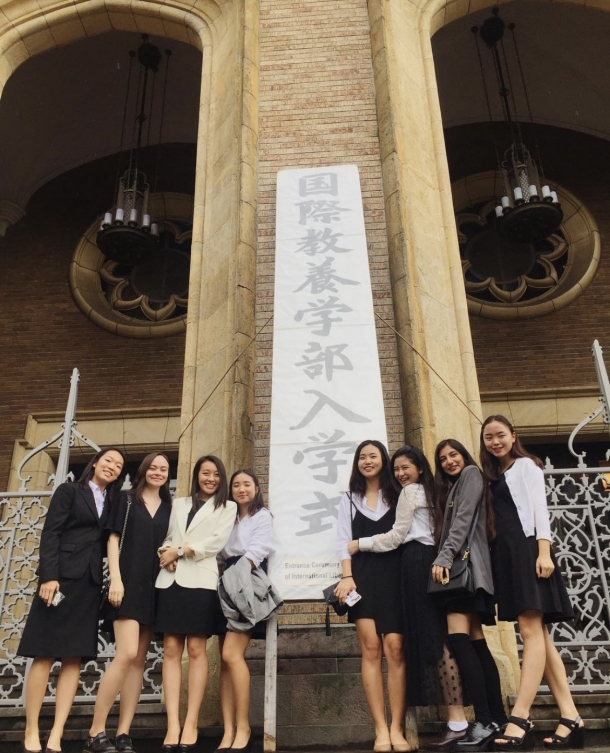
Zen at the SILS Entrance Ceremony in September 2018 (fourth from the left).
I did a one-month exchange program to Japan through an International Organization called the Lions Clubs when I was a junior high school student. Since I was young, my family also hosted many Japanese students who came to Malaysia and that gave me the chance to interact with Japanese people from a young age, sparking my interest in Japan. Additionally, I wanted to learn a new language, so I decided to study abroad in Japan. After graduating from high school, I came to Japan and attended a Japanese language school for two years, after which I entered the School of International Liberal Studies (SILS) in Waseda. I wasn’t exactly sure what I wanted to study back then, which is why SILS was perfect because it offers the opportunity to study a wide variety of subjects. There are students with many kinds of backgrounds at SILS which makes it even more interesting. I am glad that I have found my passion in environmental studies, so right now, I am attending the advanced seminar of Professor Hiroshi Ohta (Faculty of International Research and Education), who teaches Global Environmental Politics and International Relations. I am also writing my Bachelor’s thesis on the gap between youth changemakers and the current system and state of power in regards to environmental issues.
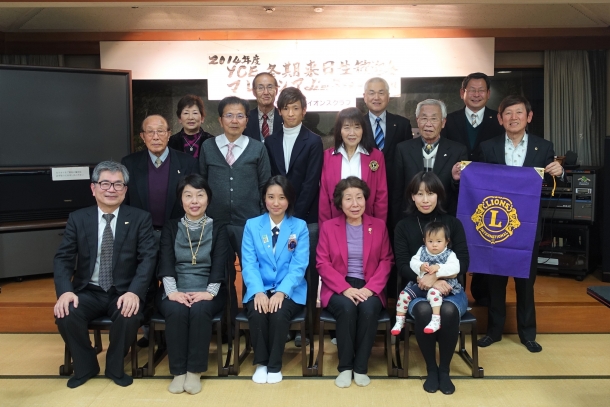
Zen at the welcome party of her exchange program to Japan in Dec 2014 (third from the left on the front row)
――Lastly, can you tell us about your future aspirations?
After graduating, I plan to work at the diving training organization where I am currently an intern, while continuing my yoga lifestyle and advocating for the environment. I wish to go to India again to obtain my RYT500 advanced yoga teacher certification. Eventually, I hope to return to Malaysia and create a community space connecting yoga, sustainability, and nature, while running my environmental conservation organization. Also, I am interested in addressing environmental issues through politics. As young leaders in Malaysia start to become more prominent and promising, I might even enter politics someday to take a supporting role or take up a leadership position. I would like to tackle environmental issues in Malaysia in some form or another.
Edition #812
Reported by Yamamoto Hiroto
School of Political Science and Economics 4th year
Waseda Weekly Reporter (SJC Student Staff)
【Profile】

Born in Kelantan, Malaysia, Szelynn is known by her nickname “Zen” by many of those around her. In June 2021, she instructed an online yoga event organized by the university’s Intercultural Communication Center (ICC). In August the same year, she delivered a speech titled “Curating a Sustainable Lifestyle” at TEDxWasedaU. Zen loves coffee and has been working part-time at a cafe for five years. She enjoys visiting different cafes with her friends. Her favorite Japanese food is sushi, and she enjoys learning from Japanese cuisine, which consist of many plant-based dishes such as tofu, which is both healthy and environmentally friendly. Zen enjoys different seasonal sports such as surfing and diving in the summer, and snowboarding in the winter.
Instagram: @zenzenw

